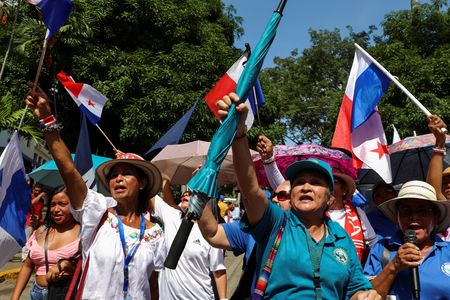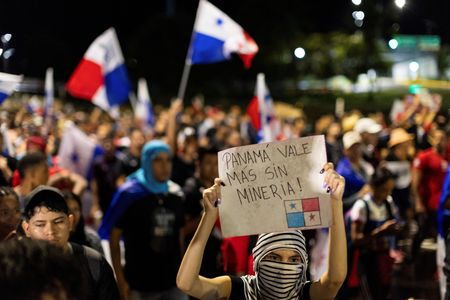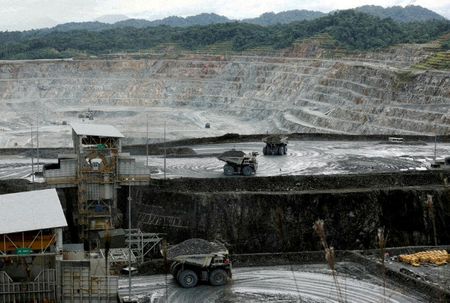By Valentine Hilaire and Divya Rajagopal
(Reuters) – Panama’s abrupt moves this week to potentially annul the contract for one of the world’s biggest and newest copper mines through a referendum and proposed law alarmed global investors and wiped out about 40% of First Quantum Minerals’ market value.
Lawmakers on Thursday ended efforts to scrap the contract by law, while a proposed bill to decide the future of the deal signed by First Quantum and the Panama government through a referendum in December is stuck in Congressional proceedings.
That leaves the fate of the contract for now in the hands of the country’s top court.
Panama’s moves raise questions about copper supplies, as Cobre Panama accounts for about 1% of global output. The $10-billion copper mine produces a critical metal for production of electric vehicles.
Canada-based First Quantum said on Friday it remains “confident” in its legal position in Panama.
Here are some questions surrounding Panama’s actions.
WHAT IS THE DISPUTE ABOUT?
The dispute dates back to 2017 when Panama’s top court deemed unconstitutional the law under which First Quantum was operating the mine.
First Quantum inherited the contract after it replaced Petaquilla Gold as operator of the mine in 2013.
Challenges against the court’s decision were rejected and the ruling was upheld in 2021, forcing the company to start negotiations for a fresh deal with the government.
The new contract, agreed on Oct. 20, was signed into law by Panama’s government, which provides First Quantum a 20-year mining right with an option to extend for another 20 years, in return for $375 million in annual revenue to Panama.
While the government has said the new contract offers better terms than the previous one, Panamanian protesters disagree.
WHAT ARE THE PROTESTERS’ DEMANDS?
The protesters say the contract is overly generous to the Canadian miner and allege corruption. They also argue the mine poses environmental risks and demand the annulment of the contract and a ban on all new mining projects.
WHAT HAPPENS NEXT?
Panama’s government allowed the miner to operate while negotiations for the contested contract took place. It has not commented on what would happen if the contract is revoked.
Lawmakers approved on Friday a bill banning new mining concessions, but it does not affect the Cobre Panama mine, which already has a concession. Nonetheless, the lifetime of the mine could be affected by the ban since the bill forbids renewing and extending concessions.
The miners’ operations could also be hurt if the top court deems the contract unconstitutional, as it could move to shut down its operations or order negotiations for a new contract.
Panama’s government has not publicly said if it was planning to nationalize the mine.
WHAT ARE LOCAL EXPERTS SAYING?
Local experts have said letting the country’s top court rule on the contract’s validity would be the best way to resolve ongoing disputes, since ending the contract unilaterally by law could open the door for international arbitration, as it would be seen as a breach of contract by Panama government.
Panama’s top court will hear various challenges against the contract in the coming days.
(Reporting by Valentine Hilaire and Divya Rajagopal; Editing by Denny Thomas and Rod Nickel)



